Key Takeaways
- Dubai offers a wide range of massage styles, from Swedish to traditional Arabic.
- Benefits include stress relief, improved circulation, and better sleep.
- Typical session costs run between150AED and600AED depending on style and location.
- Book through reputable wellness centers or verified online platforms to ensure safety.
- Know what to expect: warm environment, professional therapist, and a focus on your comfort.
Direct Answer
If you’re looking for a calming escape, Massage in Dubai delivers soothing techniques, flexible pricing, and easy booking options across the city’s hotels, spas, and dedicated wellness centers.
Comprehensive Guide to Massage in Dubai
Imagine stepping into a cool, scented room after a scorching day on Sheikh Zayed Road. A skilled therapist eases the tension in your shoulders, and the city’s hustle fades into a gentle hum. That’s the everyday magic of a good massage in Dubai - a blend of luxury, cultural flair, and modern wellness.
Definition and Context
Massage is a therapeutic practice that manipulates muscles and soft tissues to promote relaxation and healing. In the Dubai, massage has evolved from a niche service for elite travelers to a mainstream wellness staple embraced by locals and expats alike. The city’s multicultural population means you’ll find everything from classic European techniques to heritage‑rich Arabic styles, often delivered in upscale hotel spas, boutique wellness centers, and even mobile services that come to your home.
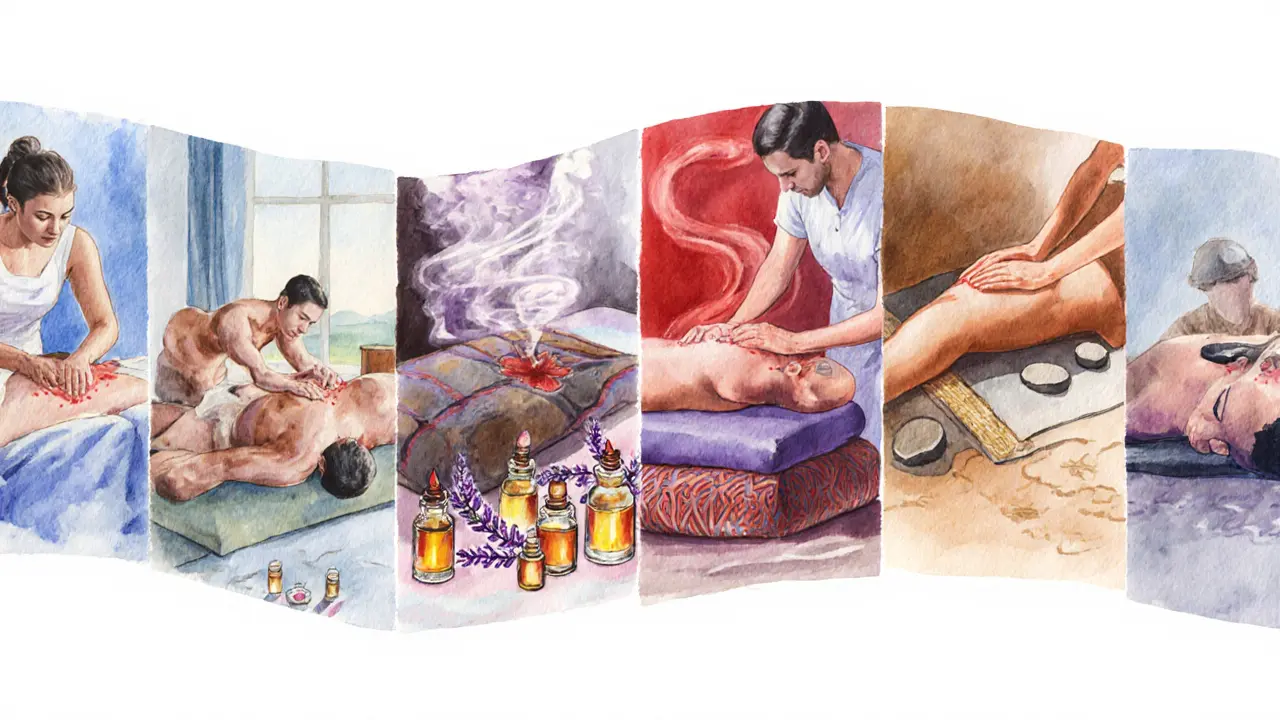
Benefits of Massage
Here’s why the buzz isn’t just hype:
- Stress reduction: Gentle strokes trigger the release of serotonin and dopamine, lifting mood instantly.
- Improved circulation: Techniques like kneading increase blood flow, helping nutrients reach muscles faster.
- Better sleep: A 30‑minute session before bedtime can lower cortisol levels, making it easier to drift off.
- Alleviated muscle tension: Athletes training for a marathon or office workers hunched over laptops both notice quicker recovery.
- Boosted immunity: Studies from the Dubai Health Authority show a modest rise in white‑blood‑cell activity after regular massage.
Real‑world example: a senior manager at a Dubai finance firm swears by a weekly deep‑tissue session at a Jumeirah wellness center; he credits it for sharper focus and fewer migraine episodes.
Types of Massage Available in Dubai
Dubai’s wellness scene reflects its global DNA. Below are the most popular options you’ll encounter:
- Swedish Massage - Light to medium pressure, ideal for beginners seeking total relaxation.
- Deep Tissue Massage - Focuses on deeper muscle layers, perfect for athletes and chronic pain sufferers.
- Aromatherapy Massage - Uses essential oils (like lavender or oud) to amplify calmness.
- Traditional Arabic Massage - A blend of rhythmic kneading and gentle stretching rooted in Bedouin practices.
- Hot Stone Massage - Warm basalt stones glide over muscles, easing tension and improving flexibility.
- Thai Massage - Combines pressure points with assisted yoga poses; great for flexibility.
Many wellness centers combine two or three styles into a customized session, so you can tailor the experience to your needs.
How to Find Massage Services in Dubai
Finding a trustworthy therapist is easier than you think:
- Search reputable hotel spas (e.g., Armani Prestige, Burj Al Arab) - they usually list certified therapists on their websites.
- Check specialist wellness centers in neighborhoods like Dubai Marina, Jumeirah, and Business Bay. Look for “Wellness Center” badges on Google Maps.
- Use verified booking platforms such as UrbanClap (now Udaari) or Bookwell. They show therapist qualifications, user reviews, and price ranges.
- Ask for recommendations in expat forums or local Facebook groups - members often share recent experiences and hidden gems.
- Confirm the therapist’s certification. In the UAE, a licensed massage therapist must hold a diploma from a recognized institute and be registered with the Dubai Health Authority.
Tip: Many places offer a “first‑session discount” of 10‑15% for new clients - a good way to test the water without breaking the bank.
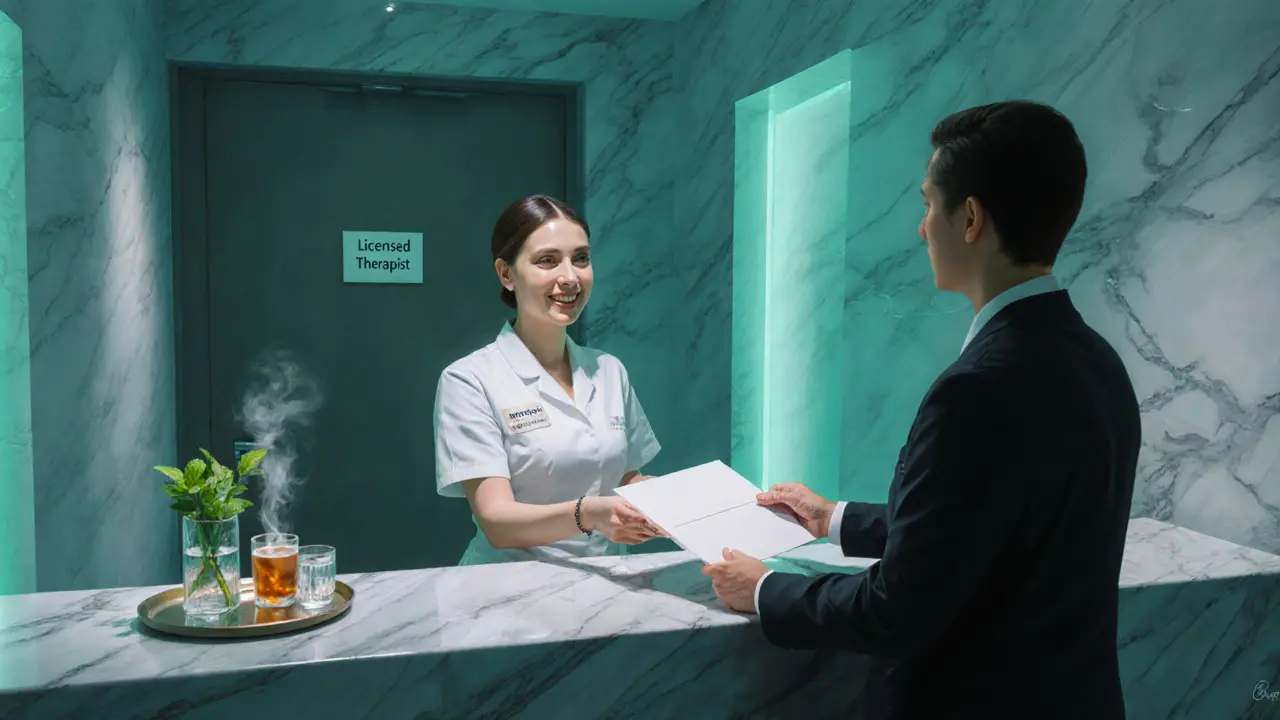
What to Expect During a Session
A typical 60‑minute session follows a simple flow:
- Arrival & check‑in: You’ll fill a short health questionnaire. This helps the therapist adjust pressure and avoid contraindications.
- Room prep: Soft lighting, calming music, and a low temperature (around 22°C) set the mood.
- Massage: The therapist explains the chosen technique, then works on your back, neck, shoulders, and any problem areas you mentioned.
- Aftercare: You’ll be offered water and a few minutes to rest. Many therapists suggest gentle stretches to extend the benefits.
Don’t be surprised if you’re offered a tea infused with Arabian mint - it’s a common hospitality touch in Dubai spas.
Pricing and Booking
Pricing varies by location, therapist experience, and massage type. Here’s a quick snapshot (all figures in AED):
- Swedish or Aromatherapy - 150AED to 250AED for 60minutes.
- Deep Tissue - 250AED to 400AED.
- Traditional Arabic - 200AED to 350AED.
- Luxury hotel spa packages (includes amenities) - 400AED to 600AED.
Most venues accept credit cards, ApplePay, and cash. To book, you can either call the center directly, use their online reservation system, or book through an app. Always ask about cancellation policies - a 24‑hour notice is standard.
Safety Tips
- Verify the therapist’s license with the Dubai Health Authority.
- Avoid massage if you have open wounds, severe skin infections, or recent surgery without doctor approval.
- Communicate pressure levels clearly; a good therapist will adjust on the fly.
- Choose clean, well‑ventilated rooms - a quick visual check of the environment can reveal professionalism.
- Never share personal financial details beyond what’s needed for payment; reputable centers keep data secure.
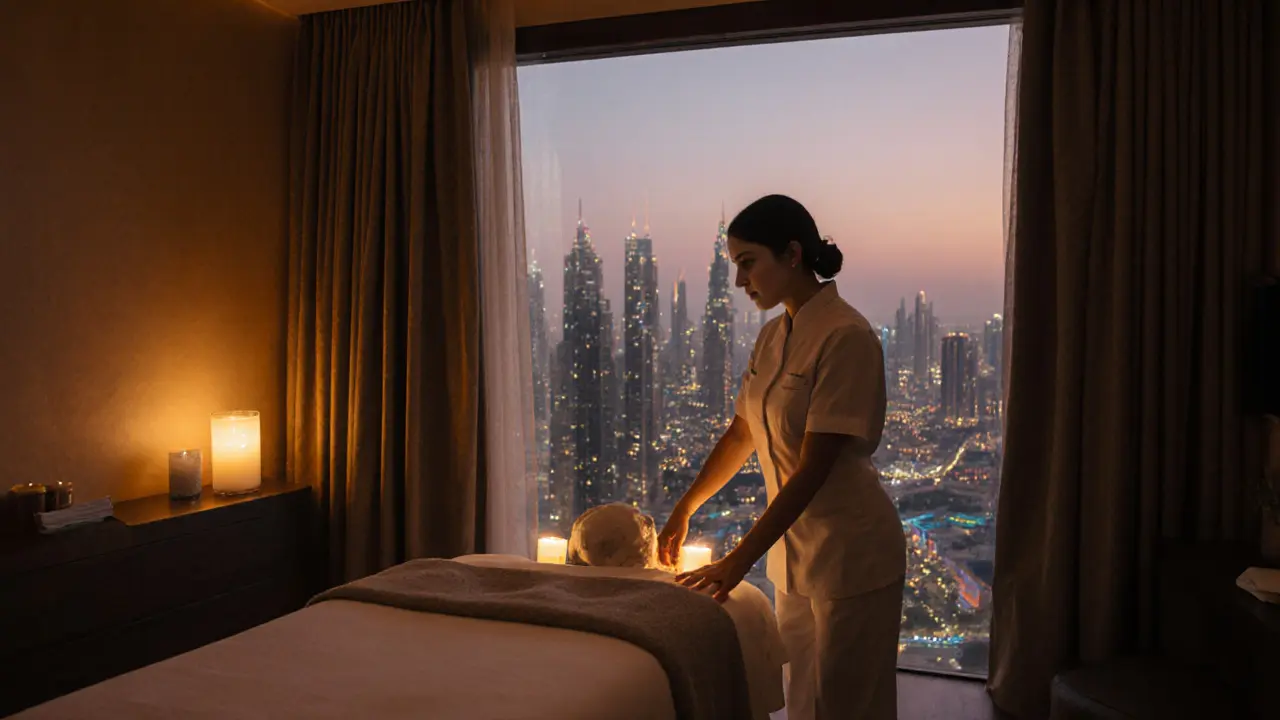
Comparison Table: Massage vs. Spa Treatment in Dubai
| Aspect | Massage | Spa Treatment |
|---|---|---|
| Primary Goal | Muscle relaxation & therapeutic relief | Overall body rejuvenation (skin, detox, hydrotherapy) |
| Typical Duration | 30‑90minutes | 60‑180minutes (often includes multiple steps) |
| Cost Range (AED) | 150‑600 | 250‑1,200 |
| Location Settings | Massage rooms, wellness centers, hotel suites | Full‑service spas, resort facilities |
| Typical Add‑Ons | Essential oils, hot stones | Facials, body wraps, sauna, hydrotherapy |
Frequently Asked Questions
Do I need a medical referral to get a massage in Dubai?
No. A referral isn’t required, but if you have specific health concerns, it’s wise to inform the therapist and possibly get a doctor’s note for certain deep‑tissue techniques.
Are male therapists available for female clients?
Yes, most reputable centers offer gender‑specific therapist options. You can request a female therapist when you book.
How often should I schedule a massage for optimal health?
For general wellness, a monthly session works well. Athletes or those with chronic pain may benefit from bi‑weekly appointments.
What should I wear during a session?
Most places provide draping sheets; you’ll typically undress to your comfort level, often just underwear. Wear comfortable, breathable clothing to and from the session.
Can I combine a massage with other spa services?
Absolutely. Many hotels offer bundled packages (e.g., massage+facial+access to the pool) at a reduced rate.
Ready to Unwind?
Dubai’s bustling rhythm can be demanding, but a well‑chosen massage session offers a quick reset button. Pick a style that fits your mood, book through a licensed center, and let the peaceful vibes wash over you. Your body-and mind-will thank you.
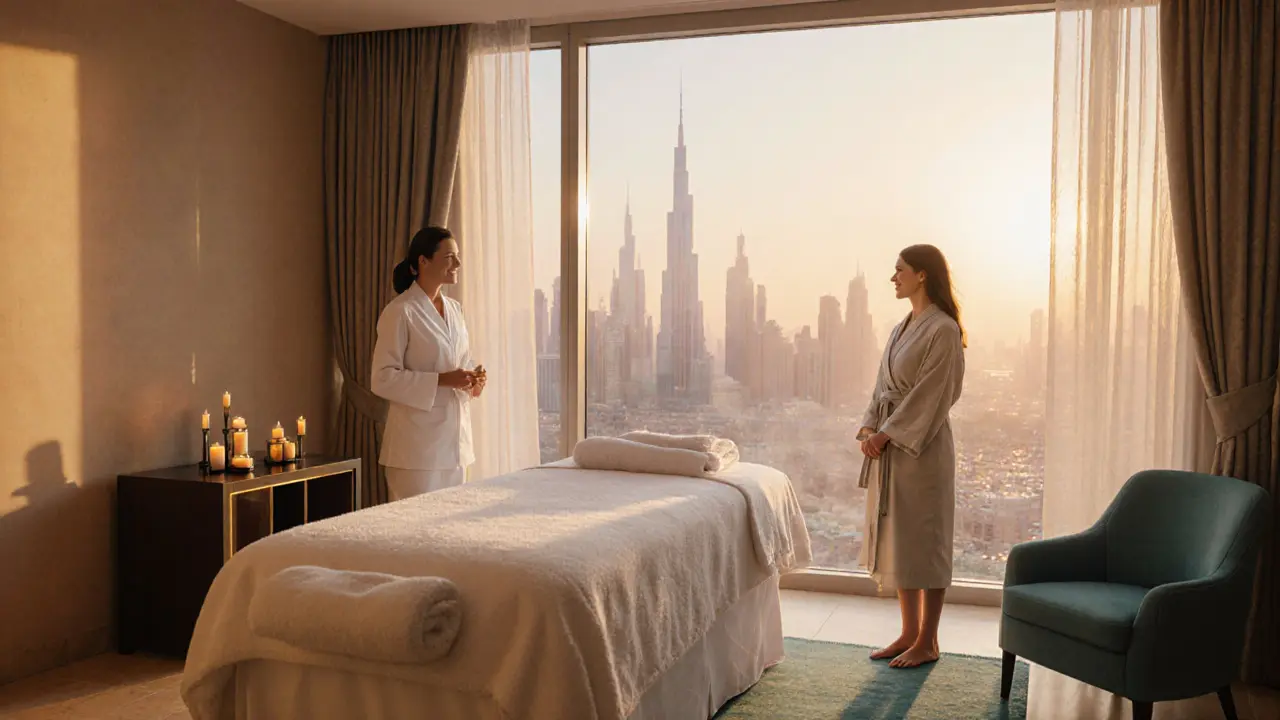
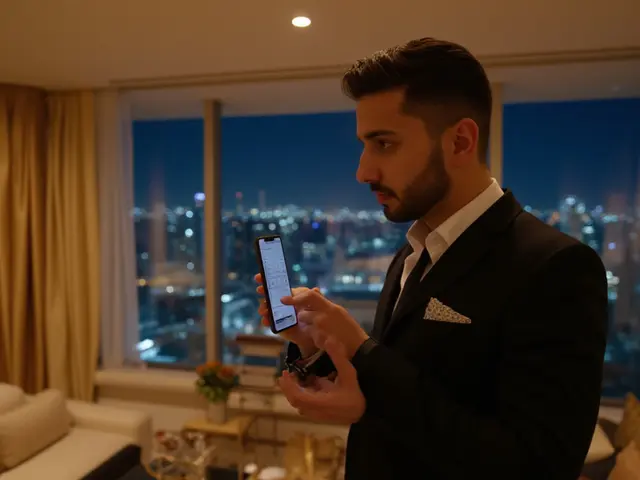

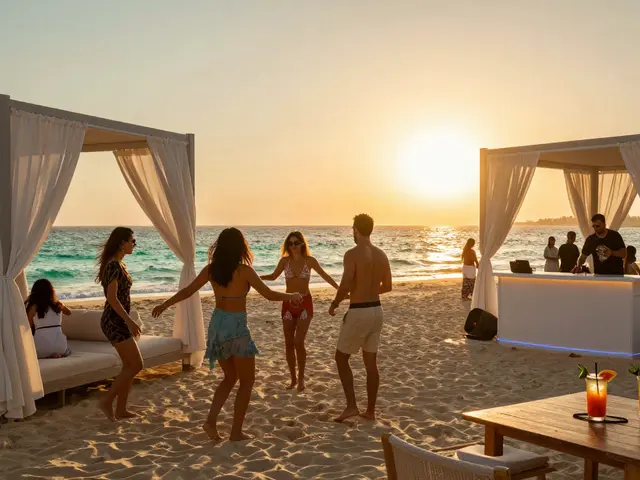
Trent Thevenot
October 9, 2025 AT 22:16Massage in Dubai isn’t just a fizzy luxury; it’s a micro‑cosmic meditation on the body’s hidden tectonics. When you let a therapist knead away the accumulated sand of traffic and heat, you’re essentially re‑aligning personal gravitas. Yet the market floods you with glossy brochures, and most tourists miss the subtle cultural nuance that the traditional Arabic style holds. In my view, the real value lies in the therapist’s certification, not the opulent marble lobby. So pick a licensed practitioner and treat the session as a brief pilgrimage toward inner equilibrium.
Kiana Rigney
October 27, 2025 AT 05:56While the proliferating wellness narrative touts “stress reduction” as a panacea, the ontological substrate of relaxation remains under‑articulated. The neurochemical cascade-serotonin, dopamine, endorphins-is often reduced to marketing fluff, obfuscating the epistemic gap between anecdotal relief and empirical validation. Moreover, the commodification of traditional Arabic massage in hyper‑tourist districts risks cultural appropriation masquerading as holistic therapy. Thus, the purported benefits are, at best, a hedonic overlay atop a fundamentally transactional experience.
Hannah Johnson
November 13, 2025 AT 14:36Great points, Trent! Just a heads‑up: when you book, double‑check that the therapist’s license number matches the Dubai Health Authority directory-this saves you a lot of hassle. Also, arrive a few minutes early to fill out the health questionnaire; it helps the therapist tailor the pressure just right. Trust the process, and you’ll walk out feeling genuinely refreshed, not just superficially pampered.
Anna Krol
November 30, 2025 AT 23:16So, let’s dive deep into the cultural tapestry that makes Dubai’s massage scene truly one‑of‑a‑kind. First off, you’ll notice that many places blend Swedish smoothness with the rhythmic strokes of Bedouin tradition-an eclectic mix that reflects the city’s cosmopolitan vibe. It’s not just about the oil or the music; it’s about how the therapist honors the client’s personal space while still offering that gentle guidance. You might walk into a spa in Jumeirah and hear Arabic poetry playing softly in the background, which, honestly, adds a layer of serenity you didn’t expect.
If you’re a first‑timer, don’t be shy about asking for a lighter pressure; most therapists are happy to adjust on the fly. The décor often combines marble and wood, creating a cool contrast to the outside heat-think oasis vibes inside a glass tower.
A little tip: bring a small bottle of your favourite essential oil; many places will let you infuse the session with a scent that feels personal to you. The after‑care isn’t just water; some centers offer a cup of Arabian mint tea that helps ground you back into the city’s rhythm.
When you compare hotel spas to independent wellness hubs, you’ll notice price differences but also variations in the level of personalized attention. Hotel spas might throw in extra amenities like access to the pool, but boutique centers often give you more time with the therapist.
Don’t overlook the mobile massage services that pop up in Business Bay; they’re convenient for busy execs who can’t step out of the office. Just make sure the therapist arrives with a proper license card and a clean setup-no excuses.
Overall, the experience is a dance between modern luxury and ancient healing practices, and catching that blend is what makes Dubai stand out on the global map. So, whether you’re after a quick Swedish session or a deep‑tissue Arabic ritual, you’re basically signing up for a cultural exchange that soothes both muscle and mind.
Remember, the key is to stay present, breathe, and let the therapist guide you through that gentle transition from stress to serenity. Enjoy the vibes!
Chaunt Elyza
December 18, 2025 AT 07:56🚀 Absolutely, Kiana-knowledge is power, and the details matter! If you’re hunting for a legit therapist, hit up the Dubai Health Authority portal and filter by “registered massage practitioner.” That way you avoid the copy‑cat salons that just slap a fancy logo on the door. Trust me, the certified pros know the difference between a therapeutic stretch and a marketing gimmick. 😉
Katie Schiffer
January 4, 2026 AT 16:36Hey everyone, just wanted to sprinkle some positive energy your way! 🌟 If you’ve never tried a Thai massage in Dubai, give it a go-you’ll leave feeling like a hyper‑charged spring. The best part? Many places throw in a complimentary smoothie after the session, which totally elevates the whole vibe. So book that slot, show up with an open mind, and let the good vibes roll!
John Irving
January 22, 2026 AT 01:16Look, I get the whole “cultural tapestry” spiel, but let’s cut the fluff. If a spa’s décor looks like a Pinterest board and the price tags scream premium, you’re paying for aesthetics, not therapeutic value. A solid deep‑tissue massage can be had at a modest joint in Deira-no need to waste AED on marble and scented candles. Bottom line: focus on the therapist’s technique, not the Instagram‑worthy backdrop.
Kat Astrophic
February 8, 2026 AT 09:56For anyone unsure about certification, here’s a quick checklist: verify the therapist’s license number on the DHA website, confirm the center’s “Wellness Center” badge on Google Maps, and read at least three recent reviews that mention hygiene and professionalism. Also, make sure the room is well‑ventilated and the linens look fresh-these are subtle signs of a reputable establishment.